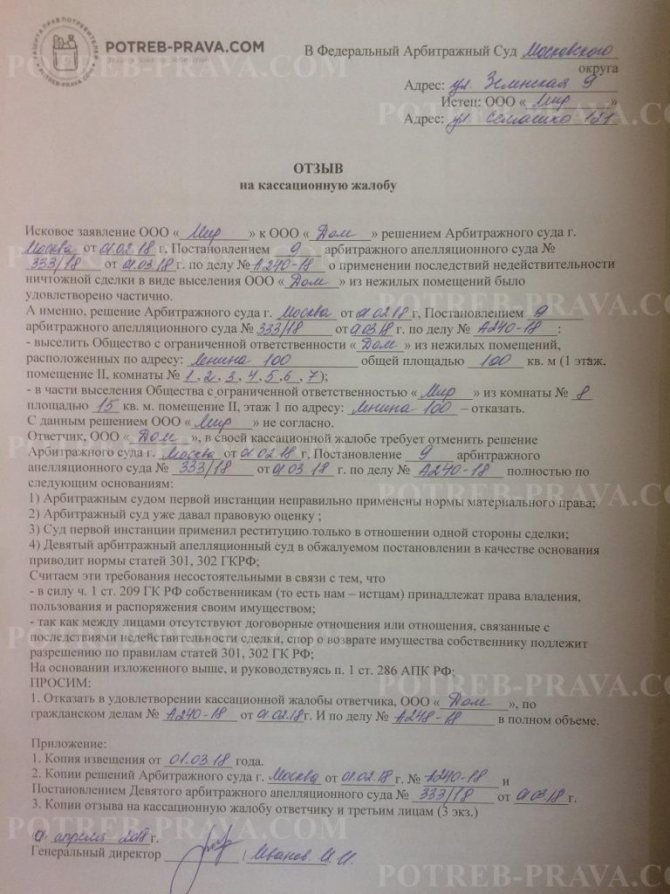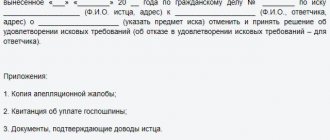Free legal consultation over the Internet 24 hoursLawyer on housing issues in St. Petersburg. Free legal consultation on labor disputes.
5/5 (3)
Sample complaint
All appeals to the arbitration court must be submitted in writing. In this case, the application is accompanied by an appendix containing a list of evidence attached to the document. Without it, the application will not be accepted.
Remember! The cassation must contain the following information:
- The upper right corner is intended to indicate the arbitration authority to which the application is sent. Next, the details of the plaintiff and defendant must be entered. The plaintiff in this situation will be the citizen filing the complaint. The data must include the full names of all parties, contact numbers, and residential addresses;
- All third parties must be indicated here, all contact information must be filled out in the same way as for the plaintiff and the defendant. When specifying the address, you must write both the place of registration and actual residence;
- The title of the document is written in the middle of the sheet. Under the title you must indicate in relation to which case the complaint is being filed;
The main text of the document follows.
ATTENTION! Look at the completed sample of a cassation appeal to the arbitration court:
Sample of a cassation appeal in arbitration
Read more about the specifics of cassation appeal in our article at the link: “Cassation in the arbitration process.”
A cassation appeal to the arbitration court is submitted in writing or electronically. According to Art. 277 of the Arbitration Procedural Code of the Russian Federation (hereinafter referred to as the Arbitration Procedure Code of the Russian Federation), this document states:
- the court is the addressee of the complaint;
- who submits the document and who else is a participant in this case;
- what judicial acts are being challenged;
- what are the violations and why judicial acts are subject to change or repeal;
- what the complainant is asking for.
A cassation appeal to arbitration must be signed by an authorized representative with the following attachment:
- copies of the contested acts;
- documents confirming the authority of the person who signs the complaint;
- confirmation of payment of the duty;
- confirmation that the complaint has been sent to other participants in the process.
A sample cassation appeal to the arbitration court can be downloaded from the link: Cassation appeal to the arbitration court - sample.
Important! If, when applying to the cassation instance, a petition is filed to restore the missed deadline for filing a complaint and the complaint is subject to being left without progress, the submitted petition cannot be immobilized.
You can find more complete information on the topic in ConsultantPlus. Full and free access to the system for 2 days.
The sequence of court actions in this case is as follows:
- resolution of the petition for restoration of the term;
- acceptance of the case for cassation proceedings or immobilization of the complaint (answer to question 3 of the Review of judicial practice of the Supreme Court of the Russian Federation No. 2 (2017), approved by the Presidium of the Supreme Court of the Russian Federation on April 26, 2017).
What documents need to be attached
Certain documents must be attached to the complaint. Without them, the application will not be considered by the court.
Such documents include:
- a copy of the decision that must be appealed. This must be a document certified by the seal and signature of the judge. A simple scanned sheet without certification will not be accepted;
- receipt of payment of state duty or documents confirming payment benefits, confirmation of deferment or reduction of payment;
- a paper that will confirm that a photocopy of the complaint has been sent to other participants in the process;
- confirmation of the signatory's authority. A photocopy is not accepted as a document. Either the original or a notarized copy must be provided. This requirement is contained in the information letter of the Presidium No. 99 dated December 22, 2005.
Important! All of the above documents can be sent by email. But it must be taken into account that submission via the Internet is possible only with an electronic digital signature.
Country of Soviets
Sample of a cassation appeal against the decision of the arbitration court of first instance and the decision of the court of appeal
To the Arbitration Court of the West Siberian District (625010, Tyumen, Lenin St., 74)
from the Defendant: HOA "Name" legal address: Chairman: (full name)
Plaintiff: OJSC "Novosibirskenergosbyt" 630099, Novosibirsk, st. Ordzhonikidze, 32
case No. A45-__________
CASSATION COMPLAINT against the decision of the Arbitration Court of the Novosibirsk Region dated "___" ________ 2020 and the decision of the Seventh Arbitration Court of Appeal dated "___" ________ 2020 in case No. A45-__________ on the claim of Novosibirskenergosbyt OJSC to the Homeowners Association "Name" for the collection of debt for consumed goods electrical energy and penalties
“___” ________ 2020, the Arbitration Court of the Novosibirsk Region made a decision in civil case No. A45-__________ on the claim of Novosibirskenergosbyt OJSC (hereinafter referred to as the Plaintiff) against the Homeowners Association “Name” (hereinafter referred to as the Defendant) for the collection of arrears of payment for electricity consumed for general house needs and penalties for the period from “___” ________ 201_ to “___” ________ 201_. The Plaintiff's demands were satisfied by the court in full.
The Defendant’s side did not agree with the court’s decision, filed an appeal and, based on the results of its consideration, this decision was left unchanged, the appeal was not satisfied (Resolution of the Seventh Arbitration Court of Appeal dated “___” ________ 2020).
The Defendant’s side does not agree with the contested court decisions and considers them subject to cancellation on the following grounds.
The courts came to the conclusion that it was justified for the plaintiff to use para. 1 clause 42 and pp. “b” clause 59 of the Rules for the provision of utility services to owners and users of premises in apartment buildings and residential buildings (approved by Decree of the Government of the Russian Federation of May 6, 2011 No. 354 (hereinafter referred to as: Rules for the provision of utility services), i.e., according to indications individual metering devices (in relation to apartments where such devices are installed) and according to utility consumption standards (in relation to apartments where there are no individual metering devices).
Thus, the TOTAL VOLUME of electricity consumption by residents of the apartment building was determined by the plaintiff BY CALCULATION (as a result of adding the readings of individual metering devices reported by specific consumers (without checking these readings), and the average daily volume of electricity consumption for consumers who did not report information on individual electricity metering devices) ., and not according to the indicators of the corresponding general building metering device, which records the total electricity consumption of the residents of the apartment building (there is such a metering device in the apartment building __ on ________ street - No. ________, its testimony is not disputed by the plaintiff and is not questioned by the courts).
As part of the claim in this case, the plaintiff is essentially recovering from the defendant the cost of electricity losses in public networks. The losses of electricity in public networks themselves are considered costs for general household needs.
The plaintiff calculates losses as the difference between the readings of communal and individual metering devices, as well as the volumes of electricity determined according to the standard or using an average monthly calculation (if citizens do not provide IPU readings in the corresponding period).
This method of calculating electricity losses directly contradicts the requirements of the law, which contain clear regulations on the mechanism for calculating electricity losses, namely contrary to the Rules for non-discriminatory access to electric energy transmission services and the provision of these services (approved by Decree of the Government of the Russian Federation of December 27, 2004 No. 861 (hereinafter referred to as according to the text: Rules of non-discriminatory access), which must be followed when determining losses in electrical networks and the procedure for paying for these losses.
In accordance with paragraph.
50 of the named Rules of Non-Discriminatory Access, the amount of actual losses of electrical energy in electrical networks is defined as the difference between the volume of electrical energy supplied to the electrical network from other networks or from electrical energy producers, and the volume of electrical energy consumed by power receiving devices connected to this network, and also transferred to other network organizations.
At the same time, as follows from clause 51 of the Rules of Non-Discriminatory Access, network organizations (and in the situation under consideration, in accordance with the definitions of the terms used in clause 2 of the Rules, the defendant is one of them) are obliged to pay the cost of actual losses of electrical energy, arising in the grid facilities they own, minus the cost of losses taken into account in the prices (tariffs) for electric energy on the wholesale market.
The above-described method of calculating losses, applied by the plaintiff, not only contradicts the above legal norms, but even contradicts common sense, since the sum of the readings of individual metering devices should be equal to the indicator of the general house metering device, recording electricity consumption in residential premises and cannot in any way be more than this value. Meanwhile, neither the plaintiff nor, following him, the courts of the first and appellate instances even compared the sum of the indicators of individual metering devices for the stated periods of time and the indicator of the general house metering device No. ________, recording the electricity consumption of the residential part of the apartment building No. _ on the street. ________.
The appellate court in its Resolution indicated that there are no grounds for applying the Rules of Non-Discrimination to the relations in question (!), since the subject of the plaintiff’s demands is the collection of debt for electricity consumed for general household needs. According to the courts, special legal norms are applicable to the relationships under consideration, namely: (1) the above-mentioned Rules for the provision of utility services and (2) Rules mandatory when a management organization or homeowners association concludes ... agreements with resource supply organizations" (approved by a decree of the Government of the Russian Federation dated February 14, 2012 N 124).
However, this conclusion of the courts is erroneous, since in the framework of this arbitration case, the plaintiff filed claims for the collection of arrears in payment of energy consumption specifically for technological losses that occur in intra-house electrical networks. Electricity losses are attributed to general house needs. However, special rules on the procedure for calculating technological losses of electricity, as a component of electricity costs for general household needs, contain precisely the above-mentioned rules of non-discriminatory access.
The Rules for the Provision of Utility Services and the Rules Mandatory for the Concluding ... by a Home Owners Association ... of Agreements with Resource Supply Organizations, indicated by the courts, do not contain standards for calculating electricity losses.
The courts did not take into account and did not even find reflection in the contested decision, the defendant’s argument that the plaintiff, contrary to the requirements of paragraph 51 of the Rules of Non-Discriminatory Access, did not allocate and deduct from the amount of losses their cost, included in the prices (tariffs) for electric power. energy (by the way, this is obvious from the calculation submitted by the plaintiff to the statement of claim).
The courts did not agree with the defendant’s argument that the method of calculating electricity losses proposed by the plaintiff involves, in essence, DOUBLE ACCOUNTING of losses and, accordingly, double charging for this indicator, motivating this disagreement by the fact that the estimated charges for electricity at the end of the next billing period are removed and accrued according to the metering device (page 3 of the appeal determination).
This court's argument is untenable due to the following.
Based on the results of verification of the readings of individual electricity metering devices, the plaintiff recalculates the volume of consumption in relation to each specific consumer and, if the actual volume of consumption, identified by the readings of the metering devices, exceeds the paid amount (and this occurs in most cases), the plaintiff attributes this excess to consumer debt.
However, earlier, having calculated the losses in the specified calculation method, without taking into account the readings of the common house meter, as prescribed by the said rules, the plaintiff had already billed the defendant for unpaid electricity by consumers, classifying it as electricity losses in the electrical networks and including it in the consumption debt electricity for general house needs.
According to the explanations of the representative of the plaintiff, in order to avoid double accrual for the same period of time, after determining the actual electricity consumption by metering devices, all previous calculated consumption data are removed (paragraph 2, page 6 of the contested decision). However, from the calculation of the claims submitted to the court by the plaintiff, this statement is refuted: from the calculation it does not follow that the plaintiff, based on verification of the readings of individual metering devices, recalculated the indicator of electricity consumed by residents of the apartment building and, accordingly, recalculated the indicator of electricity losses with attribution of this indicator to the debt of the defendant for payment of electricity for general house needs.
Thus, the calculation of the defendant’s debt for paying for electricity for common house needs, presented to the court, indicates precisely DOUBLE ACCOUNTING OF ELECTRICITY LOSSES by the plaintiff and the derivation of the defendant’s debt in this case on the basis of this double accounting: the plaintiff receives payment for electricity losses twice: the first time from the management company (in this case, from the defendant HOA “Name”), calculating the debt according to this indicator contrary to the requirements of the above Rules, and a second time from individual consumers in the form of the difference in the estimated volume of consumption (or the reported volume of consumption according to the indicators of an individual meter without the corresponding verification) and actual volume of consumption.
The above arguments indicate a gross violation by the courts of first and appellate instances of substantive law, which is the basis for the cancellation of the contested court decisions by the cassation court.
Based on the above, and guided by Part 1 of Art. 273 Arbitration Procedure Code of the Russian Federation,
ASK:
decision of the Arbitration Court of the Novosibirsk Region dated "___" ________ 2020 and the decision of the Seventh Arbitration Court of Appeal dated "___" ________ 2020 in civil case No. A45-________ on the claim of Novosibirskenergosbyt OJSC against the Homeowners Association "Name" for the collection of debt for consumed electrical energy and the penalty to cancel and make a new decision in the case refusing to satisfy the stated requirements in full to the plaintiff.
APPLICATION:
1) a copy of the contested decision of the Arbitration Court of the Novosibirsk Region dated "___" ________ 2020 in case No. A45-_________ 2) a copy of the contested decision of the Seventh Arbitration Court of Appeal dated "___" ________ 2020 in case No. A45-_________ 3) a receipt for payment of state fees 4) receipts for sending the appeal to the plaintiff 5) documents confirming the authority to sign the appeal.
"____"_______ 2020
Chairman of the Board of Homeowners Association "Name" Full name ____________________
What is being appealed and on what grounds?
The procedure for conducting an appeal procedure in the arbitration process is prescribed in the Arbitration Procedural Code. According to the general rules, appealing to the cassation office is possible only after going through the appeal procedure.
A different procedure can only be provided at the legislative level. For example, in writ proceedings, a challenge by way of appeal is not carried out. Filing a complaint to the arbitration court is possible only in relation to judicial acts that have entered into force.
These include:
- judicial orders;
- decisions that have previously been considered on appeal;
- decisions that could not be challenged on appeal due to missed deadlines;
- court decisions on intellectual disputes.
Attention! Our qualified lawyers will assist you free of charge and around the clock on any issues. Find out more here.
A cassation appeal is filed in the following cases:
- if the provisions of substantive law were violated;
- procedural rules were not followed.
In addition, the reason may be the discrepancy between the court’s conclusions and the evidence and circumstances of the case.
Watch the video. Procedure for filing a cassation appeal:
Acceptance of a complaint against an appeal decision for proceedings
Note! Filing a cassation appeal against an appeal ruling of an arbitration court and its acceptance for proceedings is associated with the following features:
- if the decision of the court of appeal is not subject to challenge, for example, when brought to administrative liability in the form of a fine of up to 100,000 rubles, then the complaint is returned (decision of the Supreme Court of the Russian Federation dated September 28, 2017 No. 306-AD17-13179 in case No. A12-60189/2016);
- refusal to accept a complaint by cassation and its return can be appealed (part 3 of article 281, article 291 of the Arbitration Procedure Code of the Russian Federation);
- the issue of accepting the complaint, leaving it without progress or returning it is decided by the cassation judge within 5 days after the receipt of the case, and he also sets a date for the hearing, taking into account the time remaining for the opportunity for other participants in the process to file a complaint (Article 278 of the Arbitration Procedure Code of the Russian Federation).
***
So, this article outlined the requirements for filing a complaint, including the issues of signing it and attaching a set of mandatory documents, presented a sample complaint for download, and also revealed some of the nuances of filing it, accepting it for production, and preparing a response to this document.
Powers of the cassation court
Cassation courts do not check the circumstances relating to the case that were previously established by the court. If new evidence appears, you must independently apply for a review of the court decision as part of a special procedure. To do this, you will need to write a separate statement attaching newly emerged evidence.
A cassation appeal to the arbitration court is filed only if all the evidence in the case was collected, but the court applied the rules incorrectly when making a decision.
The basis for filing a complaint may be a violation of procedural legislation, due to which it has become impossible to establish the truth. If the applicant's complaint is considered, the court makes a new decision or sends the previous one for review.
Attention! When filing a claim with the arbitration court, you must pay a state fee. It differs from other claims in its large size - 3,000 rubles.
What to remember when submitting a document

Preparing a cassation appeal to an arbitration court requires compliance with certain nuances. All features of the trial stage must be taken into account. The rules and procedure for filing are enshrined in Article 35 of the Arbitration Procedure Code. It is important to take into account that the cassation stage of the case has time limits.
The functions of cassation do not include giving a new assessment of evidence and correcting errors or omissions made by the previous court. Its tasks include identifying violations of procedural norms and substantive law. The discovery of a violation should affect the final course of the decision in the case.
In accordance with the provisions of the Arbitration Procedural Code, a cassation appeal must contain specific indications of which articles and norms of the law were applied incorrectly and where the violation was committed. If at some point the cassation exceeds its permissible powers, then such a judicial act can be appealed.
What features of cassation appeal need to be remembered?
When preparing a cassation appeal to the arbitration court, it is necessary to remember the features of this stage of the proceedings. The rules for this stage, including the procedure for filing a cassation appeal to the arbitration court, are present in Chapter 35 of the Arbitration Procedure Code of the Russian Federation.
The most important thing you need to know about considering a case in cassation is the limitations of this stage. The cassation court does not re-evaluate evidence, does not independently eliminate violations, and does not perform other functions of lower courts. Its task is to identify violations of substantive and procedural law. In this case, the violation should affect the outcome of the proceedings (Part 3 of Article 288 of the Arbitration Procedure Code of the Russian Federation). According to the APC, a cassation appeal must contain indications of which provisions of the law were incorrectly applied by the first instance or appeal. If the cassation exceeds its powers, this will become the basis for appealing its judicial act.
Formally, a cassation appeal to an arbitration court is prepared according to the same rules as other procedural documents. There are requirements for the design of the text: it must be coherent and concise. Follow the sequence of presentation and list arguments from main to secondary. Make references to legal norms, judicial practice, prove the legitimacy of your position. The text must clearly formulate with which conclusions of the lower courts the applicant does not agree and what exactly the cassation is asking for.
It is also necessary to fill out the application correctly:
- choose the proper court,
- list the details of the participants in the case,
- indicate the details of the controversial judicial act,
- indicate the date,
- secure the application with the signature of an authorized person and confirm his authority,
- list the attachments to the complaint (Article 277 of the Arbitration Procedure Code of the Russian Federation).
Main mistakes when filing a cassation appeal to an arbitration court
There are three main mistakes due to which lawyers lose at the cassation court:
- The arguments of the complaint go beyond the scope of the cassation hearing.
- The arguments of the complaint do not correspond to the pleading part.
- Additional documents were submitted too late.
To learn how to correctly formulate arguments in a cassation appeal and not miss the deadline for filing it, read the article “Why lawyers lose appeals and cassation” in the magazine “Company Lawyer”.
The procedure for filing a cassation appeal to the arbitration court
You can file a cassation complaint in the following cases:
- when issuing a court order;
- in the presence of a judicial act of the court of appeal in the claim proceedings.
Attention! A cassation appeal can be filed no later than two months after the court adopted a judicial act with which the applicant does not agree. The appeal is accepted only in the court that issued the controversial ruling. The period for cassation proceedings itself is also at least two months. In exceptional cases, the period is extended to six months.
When preparing a cassation appeal to an arbitration court, it is important not to make a mistake when choosing it. The main part of the applications is transferred to the district arbitration court. But in this case, what is also important is what kind of dispute is being considered.
If the court is considering a dispute regarding intellectual property, then it is necessary to apply to the court for intellectual rights. The same court also considers complaints against court orders in this category of cases. If he spoke at first instance, then his Presidium will consider the cassation appeal.
Application for clarification of claims to arbitration.
Read how to calculate the state fee in court here.
How to file a complaint against a judge to the Qualification Board of Judges, read the link:
Grounds for filing a cassation appeal to the Supreme Court
The Judicial Collegium of the RF Armed Forces for Civil Cases considers:
- complaints of the parties against judicial acts adopted in the arbitration courts of the constituent entities and courts of appeal;
- complaints against rulings of district arbitration courts and intellectual property rights courts.
The most common reason for appealing to cassation is disappointment in the outcome of the appeal process. But if the dispute was previously considered in the district arbitration court, then in order to appeal to the RF Armed Forces it is necessary to find a significant reason: errors in the application and interpretation of the rules of civil law and the arbitration process, which led to a violation of the rights of the parties, influenced the outcome of the consideration.
Watch the video. Procedure for filing a cassation appeal:
Feedback on the cassation appeal
The process of reviewing a cassation appeal provides participants with the opportunity to put forward their objections to the position of the party. This right is expressed in the submission of a response from any participant in the arbitration process.
Remember! Submission of a review is carried out according to the following rules:
- the document is signed by an authorized person;
- the attachment is a paper that confirms the right to sign the review;
- the review along with the application is sent to participants by registered mail with notification;
- the same documents are sent to arbitration. Interested parties are provided with proof of distribution.
The established procedure assumes that documents are also sent by email. However, legal requirements must be met.
ATTENTION! Look at the completed sample response to the cassation appeal:

According to judicial practice, the following nuances of filing are determined:
- the response to the complaint is signed by the head of the company that submits it. Signing by third parties who support the provision of legal services is unacceptable;
- if the complaint is filed untimely, this is not a reason for postponing the consideration of the case in order to prepare a review.
In this case, regarding the second point, information about the hearing of the case must be received in a timely manner, in compliance with all deadlines.









